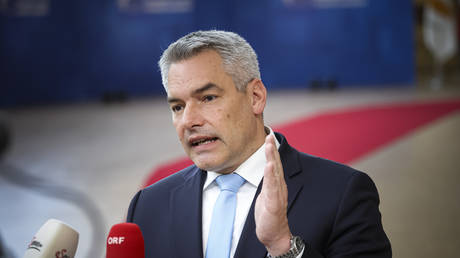ARTICLE AD BOX
Vienna is objecting to Ukraine’s designation of its Raiffeisen Bank as a “sponsor of terrorism” for doing business in Russia
EU ambassadors have reportedly failed to reach an agreement on a 12th round of sanctions on Russia after Austria halted the negotiations, according to Radio Liberty’s European Affairs Director Rikard Jozwiak.
In a post on X (formerly Twitter) on Tuesday, the journalist reported that Vienna had expressed dissatisfaction with the fact that Ukraine’s National Agency for the Prevention of Corruption (NACP) had designated Austria’s Raiffeisen Bank as an “international sponsor of war” for continuing its business in Russia.
There has been no official confirmation of the suspension of negotiations on the EU’s latest sanctions package.
Jozwiak’s report, however, comes after Austria officially joined Hungary and Slovakia in openly opposing any expedited accession talks with Ukraine, which had previously been recommended by the European Commission.
During a government meeting on Monday, Austrian Federal Chancellor Karl Nehammer insisted that there should be no preferential treatment for Kiev in its path towards membership, stating that the EU was not yet ready for enlargement.
Read more Third EU state objects to Ukrainian membership talks
Third EU state objects to Ukrainian membership talks
The Austrian leader’s statements were backed by Slovakian Foreign Minister Juraj Blanar, who said he “couldn’t imagine” Kiev joining the union while it remains in a “state of war.” Hungarian Prime Minister Viktor Orban has also warned that the EU’s agricultural sector would collapse if the bloc suddenly accepted Ukraine.
Orban previously opposed the EU’s sanctions on Russia, warning in a letter to European Council President Charles Michel last month that he would block any further restrictions, financial assistance, or accession talks with Kiev, unless the union first holds a “strategic discussion” about the feasibility of its objectives in Ukraine.
The Hungarian leader argued that the European Council was simply not prepared to make any key decisions on Ukraine policies, including security guarantees, further aid, Russia sanctions, and the expansion of the EU, until all member states reach a consensus on their strategy.
Earlier this year, Orban also demanded that Ukraine remove Hungary’s OTP Bank from its list of “international sponsors of terrorism,” warning that Budapest would end its participation in any further EU funding for Ukraine and would find it “very difficult” to agree with the EU on new sanctions against Russia.
In response, Kiev agreed to temporarily suspend OTP Bank’s status.
.png)
 1 year ago
9
1 year ago
9








 English (US)
English (US)